There are among us a few gurus who have long perfected the art of working remotely. These are the people who already had a home office setup and didn’t need to buy an office chair or an extra monitor on Amazon a couple months back. They have long possessed the noise-cancelling headphones you need to block out the sounds of your partner loudly washing the dishes in the middle of your team Zoom call. These are the people like Blas.
Blas is the lead engineer at Basepair and has a fascinating background. He’s a digital nomad and has traveled, lived and worked in dozens of countries. Last month, I sat down with him to learn more about his background, why he decided to go remote, and got his advice on working and managing a remote team.
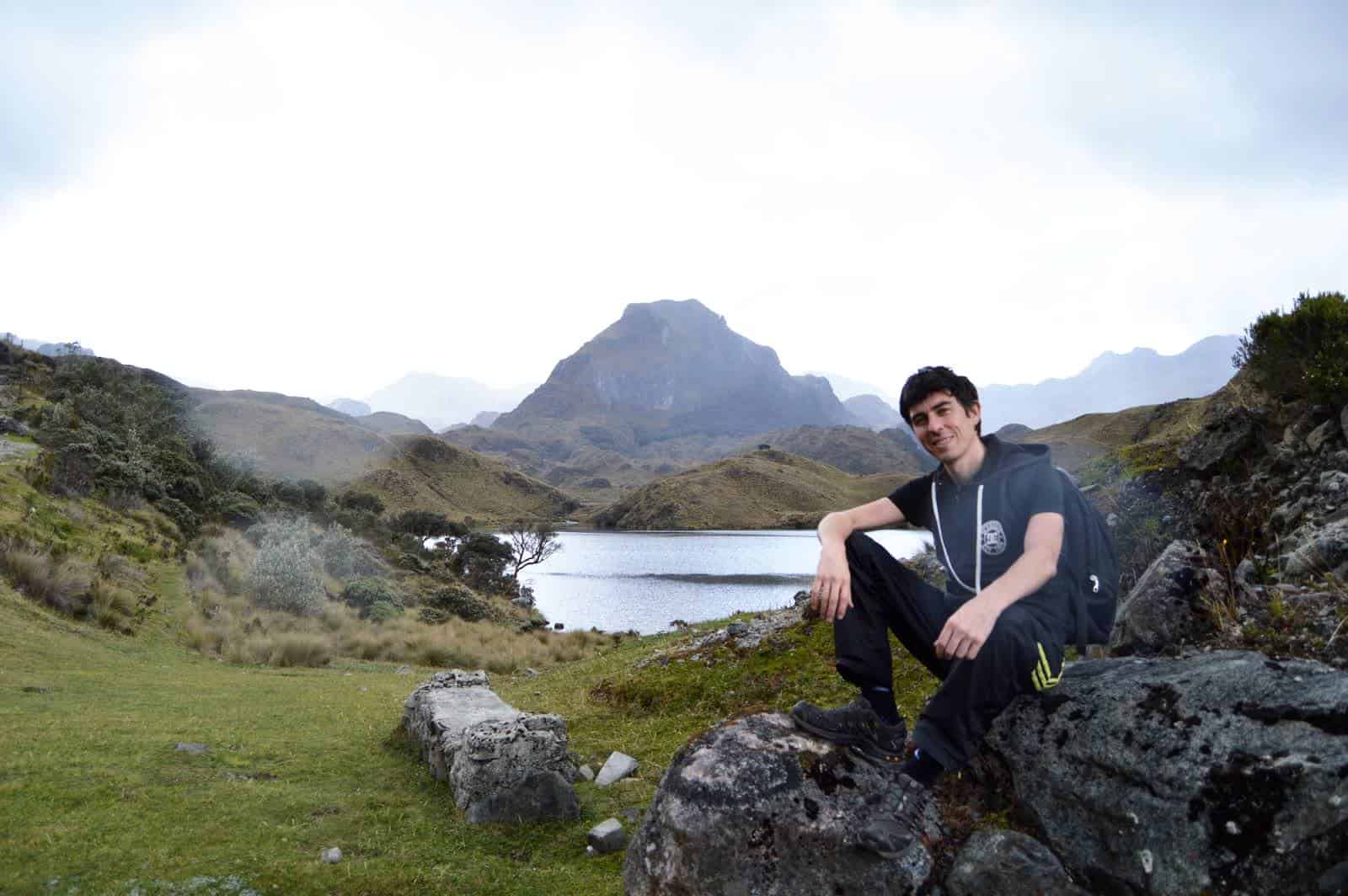
~~~
Blas’s first paid foray into computer science began with cows. A family friend who was also a veterinarian had developed a system to predict, using a few variables like weather and the kilometers a cow had walked, the quality of the milk that cow would produce. The system became highly popular among dairy farms in Argentina, and soon the vet needed to migrate the system to a new framework. Blas was developing his own project in the new framework at the time, and so the vet hired him.
By the way, Blas was still in high school when he deployed that project. By the time he started college, Blas had already built a solid resume of experience that included an IT support job and a computer repair course. Though passionate about computer science, particularly artificial intelligence and robotics, Blas had other passions, too. In addition to his computer science courses, he studied philosophy and music in college.
At one point, Blas decided to take a gap year to hitchhike around Argentina. This fueled his passion for traveling.
“I was traveling all around Argentina with my tent and a pot where I could cook stuff. It was one of the most incredible experiences that I’ve had. I met super interesting people all around. Sometimes I’d sleep in the countryside in the middle of nowhere. Sometimes in a park. Sometimes I’d meet people who’d invite me to stay at their house for the night.”
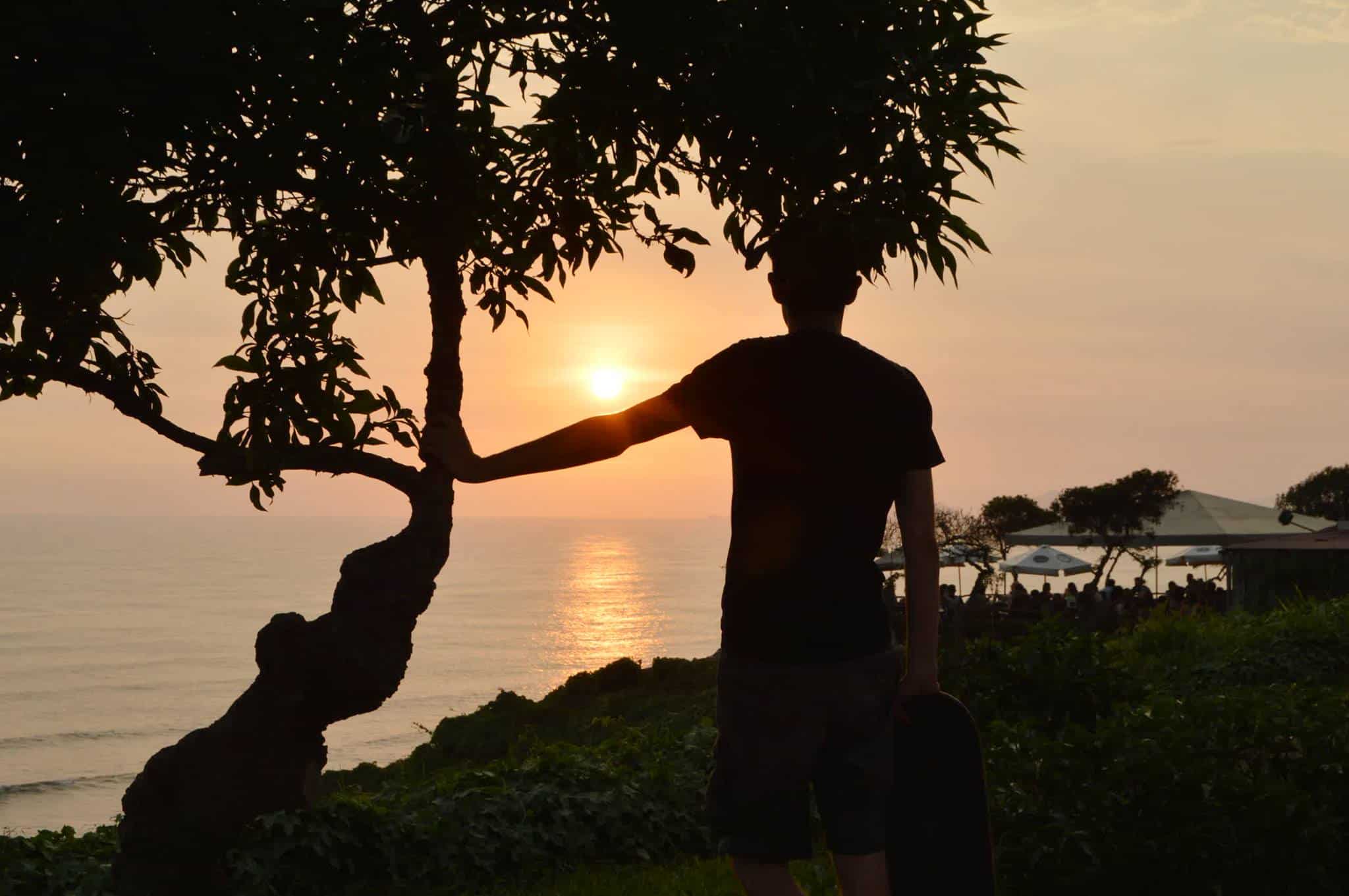
Blas in Lima, Peru.
After his gap year, Blas came back and continued his studies, eventually completing his degree in computer science. Blas jumped right back into traveling. He traveled extensively across South America to countries like Paraguay and Brazil, but was itching to go overseas as well.
“I needed money to do these kinds of [overseas] trips,” Blas recalls.
Soon, he found a US-based firm recruiting Argentinian developers. After working from the Argentinian office for a year, Blas told the company he was planning to travel to South Africa, and asked whether they wanted to keep him on staff to work remotely.
“They said, ‘Let’s just see how it goes. If you can work for us and keep the same rhythm, there shouldn’t be a problem.’ And so I did that. I worked for them while I was in South Africa for a couple years. I traveled around [during that time] — I visited Botswana, Zambia, Zimbabwe, Mozambique.”
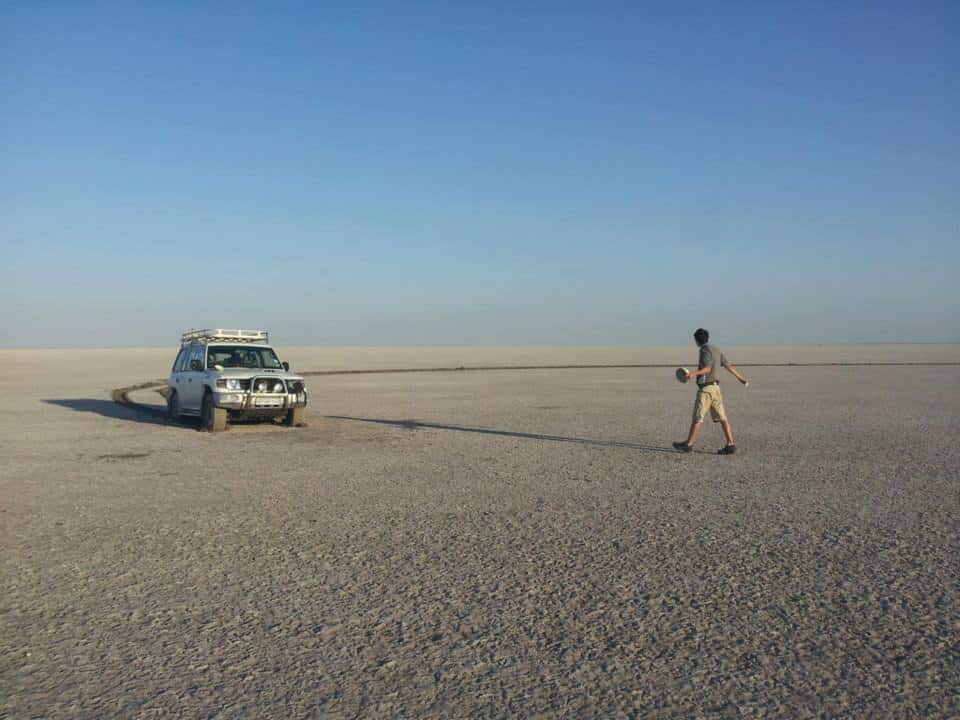
Blas in Botswana.
When Blas returned to Argentina, his employer invited him to move to the US and work for their US office. “I told them, look — I’m not planning to stay. I want to keep traveling. That was the breaking point, as they needed someone in-office in the US.” So they parted ways.
After a short sabbatical in Italy, Blas came back to Buenos Aires and worked for another software development company. During that time, he met his now-wife, Sarah, who was also a voracious traveler and digital nomad working remotely for a US company. Together, they lived and worked from Ecuador, Peru, Spain, and Croatia, staying in each country for several months at a time.
Fast forwarding to 2019, after looking for a more challenging role with greater responsibilities, Blas accepted a position as a software engineer at Basepair. He currently manages projects, architects software, designs the structure of the Basepair application, and supervises more junior developers to maintain good quality and structure of code.
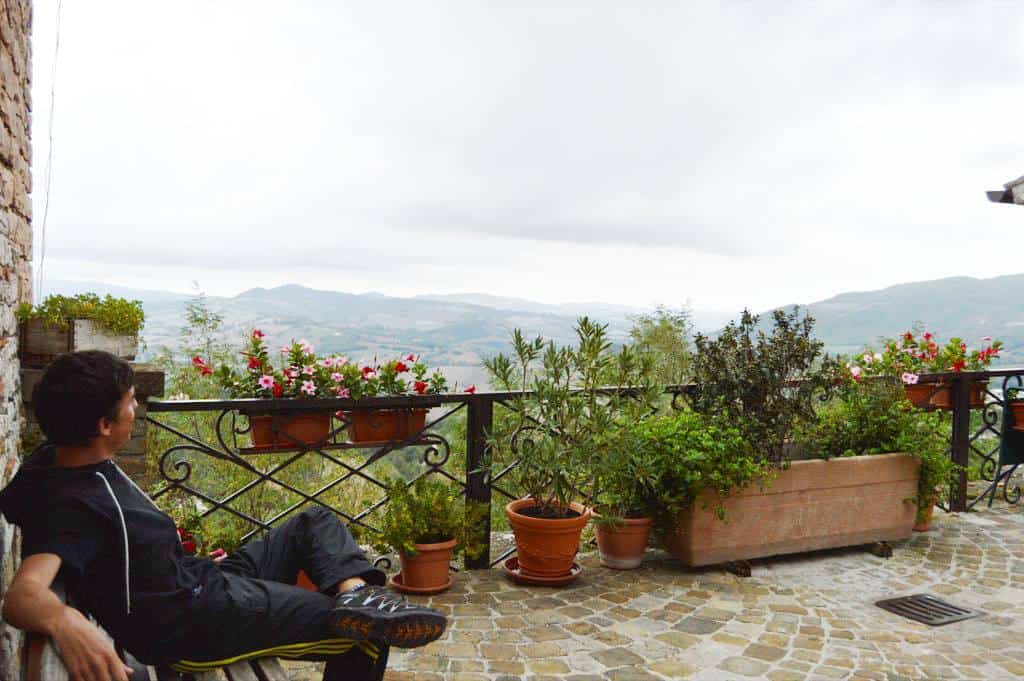
Blas in Italy.
~~~
Janneta: A lot of people have no choice right now but to work remotely. What advice would you give to someone who is new to working from home?
Blas: I try to be organized and responsible. Not just with work tasks, but with my life in general. I try to work no more than 8 hours per day. Sometimes I have to; there are many things to do, and we have deadlines. I’m a workaholic, so it’s hard for me to work only 8 hours a day. [But] if you spend too much time working, you lose balance with the rest of your life. You should exercise, have hobbies. Have other things to do, not just work.
When I’m working, I don’t get distracted. Be 100% focused on the thing you are doing. If it’s time to work, just work. If it’s time to have lunch, have lunch. If it’s time to watch a movie, watch a movie. That’s the way I do it.
Have you always been this focused?
I have always been this focused. When I have a task, I have to solve a problem, and I get very passionate in finding a solution, so I’m 100% focused on solving the issue.
Also, I try to define a workplace. Define a workplace that best suits you. For me, it’s super comfortable to work from the couch and not from a desk! I put on my headphones and I work. I have a little table on the side where I can put my mug of coffee or maté (caffeinated South American drink). This helps generate a mindset: if you go to the office, you know you go there to work. In your house, it’s more difficult because in your house you do other stuff. If you define your workplace, you have the mindset of — “this is the place to work, and not to do other stuff.”
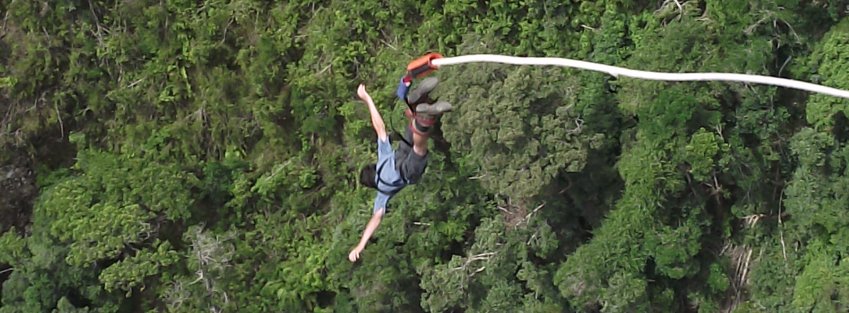
Blas in South Africa.
A big chunk of the Basepair team is based in different cities and different time zones. How do you and the rest of the team at Basepair manage projects and maintain productivity while being 100% remote?
Overlap hours and improve communication as much as you can. Only bother other people when you really need help. Don’t waste time when you try to communicate something, and be direct.
Also, use the proper tools. Like assigning tasks through Asana, for example. We are able to avoid ‘dead time’ in between. If I wake up here in Spain, I’ll be a couple hours ahead, and if you leave tasks in Asana, I can see them and start working on them without waiting for you to wake up in another time zone. If there are tasks that require more detailed feedback from other people, we do them when we overlap times so we can have real-time communication. For those tasks that don’t require feedback, you can work on those when you are online and it doesn’t matter if there are others online.
I’m not in favor of too many meetings. Even 2 per week is a lot! We have two general meetings per week, and I think that maybe even one would work. We are still a small team so we don’t require as many meetings. I remember in my other larger companies we’d have meetings every day.
What are the biggest challenges of working remotely, and how have you dealt with these challenges?
Developing a good relationship with your coworkers. When you work from home and are not physically in the same place as another colleague, it’s challenging. It’s more difficult to say to someone ‘Hey, I think this code that you wrote needs to be improved’ if you never talk to them. When you work remotely, that’s something you need to be aware of and find a way to work around it.
So how do you work around that?
*Laughs.* I think I’m a pretty cool guy. I try to be nice and polite and funny. [The offsite in Spain] definitely helped build a better relationship in the team.
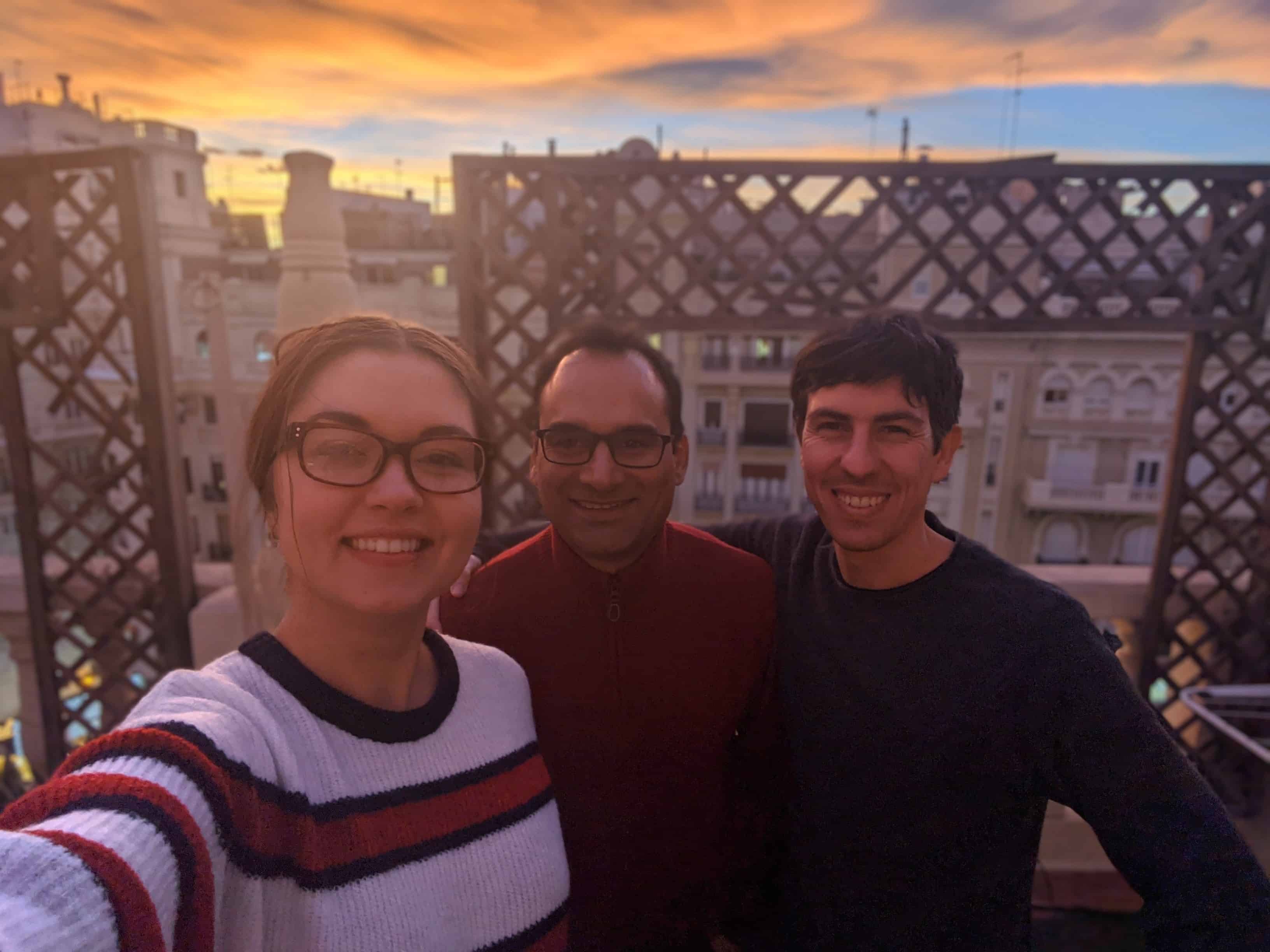
The Basepair team in Valencia, Spain. Left to right: Janneta (marketing), Amit (CEO), Blas (software).
How do you overcome the social challenges of working remotely? What practical things have you done?
Social life is something you have to spend more time on. The workplace gives you an opportunity to meet people and socialize. When you work inside your house 8 hours per day, it’s 8 hours that you don’t interact with anyone. Your social life will require more energy if you work remotely.
Try to find places where you have to interact with people. Like football (soccer). You can’t play by yourself. You have to find a team, and after football you might have some beers. Find things to do to interact with other people. Or join a wine tasting club. Really anything that would require you to interact with other people.
Right now you’re living in Valencia, Spain, and you’ve decided to apply for residency and stay there for a while. Why did you decide to take a break from moving to a new place every few months, and why did you choose Valencia?
If you’re moving a lot, you know the people you meet are not people who will be with you for life. They are friends for the couple of months you are there, and you may not see them again in your entire life. You don’t spend too much energy socializing because you know they won’t be there anymore. Lately, it had been kind of difficult for Sarah and I to make new friends and keep them. That was one of the reasons we chose to have a base where we can build a social life. We don’t want to stop traveling, but maybe change the way we are traveling.
Why Spain? We traveled a lot and tried to find a place that fit our needs and pace. Valencia was a magical city for us. It has what we both want in a place. I enjoy a lot of green spaces and Valencia has a lot of them. It’s also close to the sea so we have a beautiful beach in the summer. It’s also a city with all the amenities of a city. Really nice public transit, a lot of restaurants and nightlife. There are a lot of shows; not now, of course, but there are operas, museums. A really rich culture, an amazing history. It has a lot of stuff we really enjoy. Valencia was a winner.
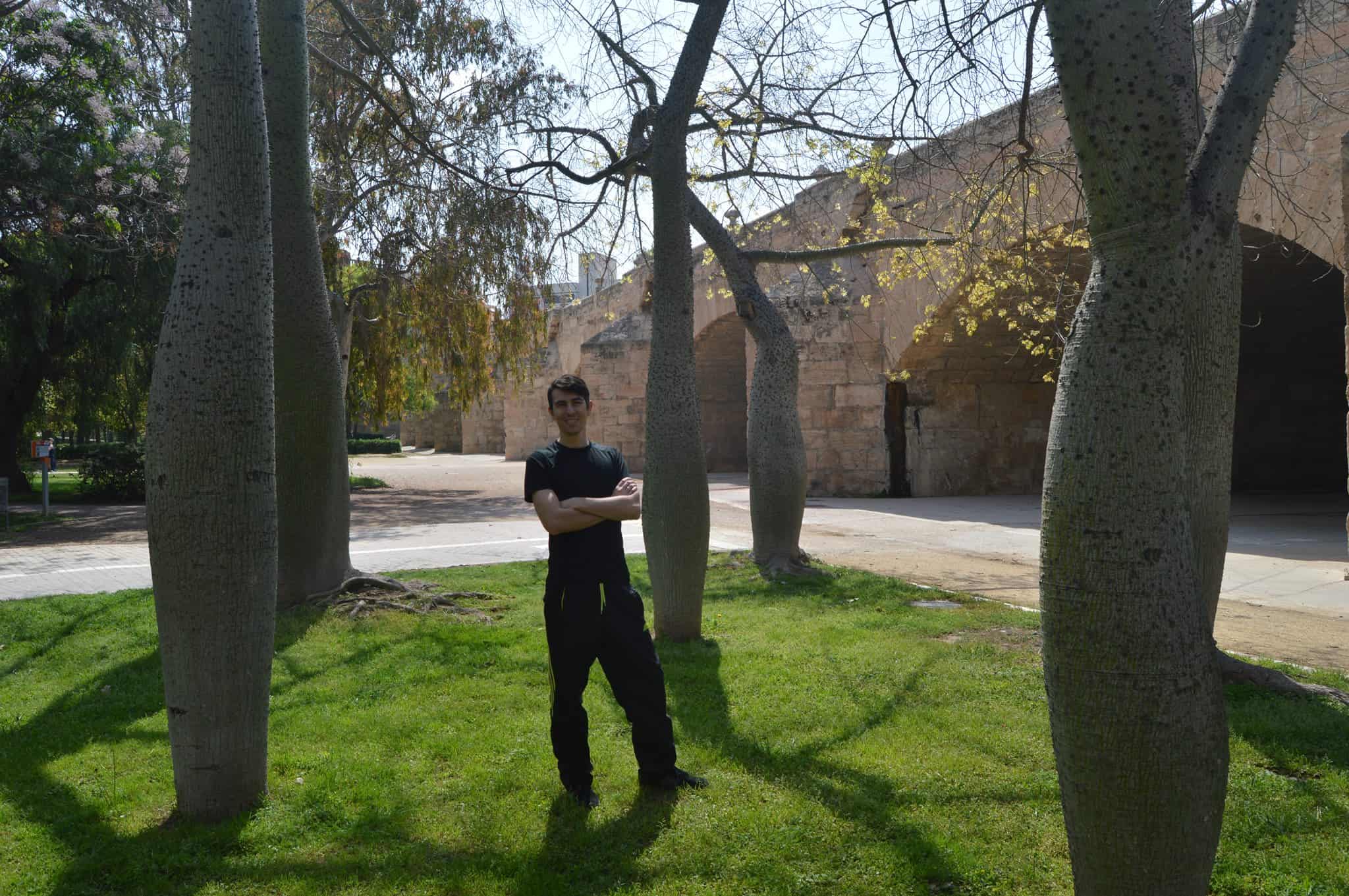
Blas in Valencia, Spain
Taking a step back, what is the greatest benefit that working remotely brought to your life?
Moving all around, it opened my mind in a way I cannot describe. It’s like — I’m super easy going, and I think it’s something that comes out because I traveled a lot. I met so many people from different cultures who speak different languages, who think and approach things so differently than me. If I were to work in an office, I wouldn’t have had that chance. Working remotely really gave me the chance to enrich my life.
When I was in South Africa and I was living in the Zulu region, I learned some Zulu words. When I lived on the Xhosa side, I learned some Xhosa words. People are so different in different places, and they have different ways of expressing ideas. It makes some things pretty fuzzy, but at the same time gives a lot of color to the perception of your reality. If you are able to listen, and listen properly, and try to absorb others’ point of view, that enriches your life experience.
Connect with Blas on LinkedIn: https://www.linkedin.com/in/blasvicco/
